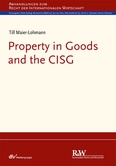II. Claims by or against third parties
537
The CISG does not preempt or modify claims based in national law in the following two scenarios. First, if a third party claims to be the owner and aims to revindicate or claim damages for the goods from either the buyer or the seller. Second, if one of the latter aims to revindicate the goods or claim damages from a third party. Vis-à-vis a third party, the questions of who should be in possession of the goods or who must be compensated are not matters that can be decided or influenced by a sales contract to which the third party is not a party. Furthermore, whether the claim is based on a right in rem and, consequently, may be considered superior compared to a claim by a different, unsecured creditor under the CISG, exceeds the CISG’s scope.1115 The ranking of creditors is outside the sales transaction.
538
This includes the seller’s claims based on property against the carrier who transports the goods to the buyer: Article 71(2) of the CISG allows the seller to stop the goods in transit if it becomes evident that the buyer will not perform a substantial part of the obligations because of a serious deficiency in the ability to perform, or in the creditworthiness or conduct in preparing to perform or in performing the contract. Sentence 2 of this paragraph limits its effect to the rights to the goods as between the seller and the buyer. This limitation is due to the mentioned limitation of the CISG’s scope to the sales contract and the parties to it: A seller’s right to stoppage that the carrier has to follow cannot result from a contract the carrier is not a party to. Such a right was deemed necessary in legal systems like French and English law where property passes with contract conclusion and where there are no obvious methods for the seller to safeguard the claim for the price by means
539
In the same vein, property in the goods may be relevant if a third party damages or destroys the goods. Many national tort laws will allocate the claim for compensation to the party that had property at the point in time when the goods were damaged. For example, section 823 of the German Civil Code protects absolute rights, such as property, and generally equips the owner with a damages claim against the third party.1120 The CISG does not influence which of the contractual parties has a claim vis-à-vis the third party. Yet, the CISG may lead to a different allocation of the entitlement to the compensation. For example, if goods under a retention of property clause are damaged and the buyer subsequently pays the full purchase price, the CISG requires the seller to either assign the claim against the third party
540
Concluding, third party claims against one of the contractual parties or vice versa are not preempted by the CISG.
| 1115 | Honnold/Flechtner, para. 96. |
| 1116 | Stadler, Verkehrsschutz durch Abstraktion, p. 415; Landfermann, 34 RabelsZ (1970), 523, 530. |
| 1117 | von Ziegler, 25 Journal of Law and Commerce (2005–2006), 353, 364. |
| 1118 | Norwegian Supreme Court, 6 February 2019, CISG-online 4318, but see the Dissenting Opinion by Justice Sæbø in paras. 106 et seq. |
| 1119 | Landfermann, Sicherungen des vorleistenden Verkäufers, pp. 44, 120. |
| 1120 | On property under sect. 823 German Civil Code generally, MüKoBGB/Wagner, § 823 BGB paras. 242 et seq. This restriction is, however, watered down, since for example, a buyer under a retention of property clause already receives an expectancy (Anwartschaftsrecht, cf. Kieninger, p. 249) which could also allow the buyer to sue to a third party for damaging the goods, cf. MüKoBGB/Wagner, § 823 BGB paras. 312–315. |


